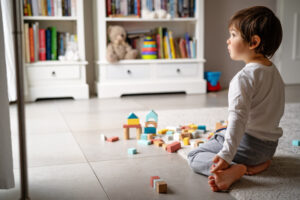“James threw a stone at another girl in Prep today.”
“Ben won’t listen and doesn’t follow instructions.”
“We just let him do what he wants, otherwise he pushes his little sister and screams and shouts.”
“He is such a terror. I don’t know where this behaviour comes from”.
“He lied about where he got tuck money from, but you know, he’s only 5.”
“He just won’t co-operate and throws temper tantrums if you insist!”
Does this sound familiar? Perhaps you know of a friend or colleague who’s always saying these things. Perhaps these are things you find yourself saying? Whilst the above does not necessarily constitute oppositional defiant behaviour, they are certainly worrisome behaviours in young children. Without intervention could lead to more problematic behaviours. Whilst some of this behaviour may be normal for a child between the ages of 3 to 5, a persistent pattern of behaviour and the underlying defiance that may accompany it, can be problematic. But when is it problematic and when does it require the intervention of a professional? Let’s have a look at what exactly constitutes oppositional defiant behaviour first.
So, what is Oppositional Defiant Disorder (ODD)?
ODD is a set of pervasive and repetitive behaviours often found in young children, but can be diagnosed through adolescence and into adulthood. In a child as young as 3- 5 years, the DSM 5 states that “the behaviour should occur on most days for a period of at least 6 months unless otherwise noted.” So this type of behaviour is persistent and does not refer to just on a few occasions.
These behaviours include:
- Arguing with authority figures
- Deliberately disobeying rules and instructions
- Blaming others for their behaviour
Hurtful and revengeful behaviour
- Deliberately spiteful and mean
ODD is more prevalent in boys, but can also be diagnosed in girls.
ODD and attachment
Children with ODD may experience attachment difficulties and may have an insecure attachment. An insecure attachment is where their needs may not have been met for various reasons, and they feel neglected, deprived and unsafe. Their world may be a scary one where adults are regarded as untrustworthy and unreliable. They struggle to cope with their underlying feelings of anger and rage for not having their needs met and act them out, also resulting in very unhelpful behaviour.
This type of attachment may form in a chaotic and disorganised family home where the child can also be subject to or witnesses abuse and neglect. In these types of homes discipline is often very punitive and inconsistent. However, on the other end of the spectrum, children can be “spoilt” and have too much done for them, not learn independence and not learn to be responsible for their behaviour through not having to face consequences for their behaviour.
There are many theories surrounding what type of insecure attachment children with ODD may have. In moving forward, it is important to focus on attempting to repair this attachment and create a loving and caring attachment with your child in a house with structure, consistency and routine.
ODD and other diagnosis
Often ODD is co-morbid with other psychiatric illnesses such as attention deficit hyperactivity disorder, a learning difficulty, impulse control difficulties and frontal lobe defects as well as
depression and anxiety. A trained professional will be able to assist you and have your child correctly diagnosed.
Trauma also has a huge role to play in the development of ODD as well as other possible diagnosis such as tics. Tics are sudden, repetitive, uncontrollable movements or sounds that are repetitive in nature. A common condition associated with tics that you may have heard of is Tourette’s Syndrome. ODD can often be found in children diagnosed with Tourette’s and there can be an overlap.
What can I do?
I think my child may have ODD, so what can I do?
Seeking professional help is fundamentally important in the treatment of ODD. A professional can identify aspects of the system and the child’s behaviour that needs intervention, that can often be difficult to achieve on our own. Parental training and behavioural programmes (based on a positive rewards system) can assist in coping with the behaviour exhibited by these children. Family intervention and therapy can also assist as often the behaviour is a symptom of the wider system.
Behaviour programmes can assist the child to:
- Learn new helpful ways of behaving through positive reinforcement
- Learn that their way of behaving is not helpful
- Learn the effects of their behaviour on others and assist in developing empathy
- Learn ways to cope with overwhelming feelings of anger and rage
In addition, Raising Children (2022) suggests that implementing praise for good behaviour, a reward chart system and consequences for poor behaviour such as time-out are helpful strategies for parents.
In such a young age group (3-5 years), what can also be helpful is teaching emotional regulation skills and responding to your child in a calm and empathic way.
In addition, these children can be feeling really hurt, sad and alone inside and these underlying feelings also need to be addressed and they may find it helpful to have their own therapeutic space to assist them in processing and understanding these overwhelming feelings.
Reward programmes
Reward programmes are particularly useful in assisting children with ODD. It focuses more on the positive rather than the negative behaviour. As parents, we tend to get stuck in what our child didn’t do or how badly they behaved. It tends to become a negative feedback loop where we are constantly moaning at our children and they constantly feel like nothing they do is good enough, so they just carry on doing the same negative behaviour.
It can be really hard to focus on the positives and reward our children when they are oppositional and defiant. Give them chores, things to do around the house and reward them when they have completed the task. Younger children can help pack away their toys, brush their teeth, help feed the animals. Immediate rewards work really well.
Raising children (2022) suggests that implementing praise for good behaviour, a reward chart system and consequences for poor behaviour such as time-out are helpful strategies for parents. In such a young age group (3-5 years), what can also be helpful is teaching emotional regulation skills and responding to your child in a calm and empathic way.
 Author: Dr Pauline Baleta, MA Psychology (UJ) Cum Laude, PhD Psychology (UP)
Author: Dr Pauline Baleta, MA Psychology (UJ) Cum Laude, PhD Psychology (UP)
Dr Pauline Baleta sees children from 3+ and teenagers from 14+. If you think your child could have ODD and would like to seek professional help to fix the issue, don’t hesitate to make an appointment. You can try Online Booking, or call Vision Psychology Wishart on (07) 3088 5422.
References
American Psychiatric Association, (2022). DSM-V-TR
Raising Children (2022). Oppositional defiant disorder ODD: Children and pre-teens:
https://raisingchildren.net.au/school-age/health-daily-care/school-age-mental-health-concerns/odd

